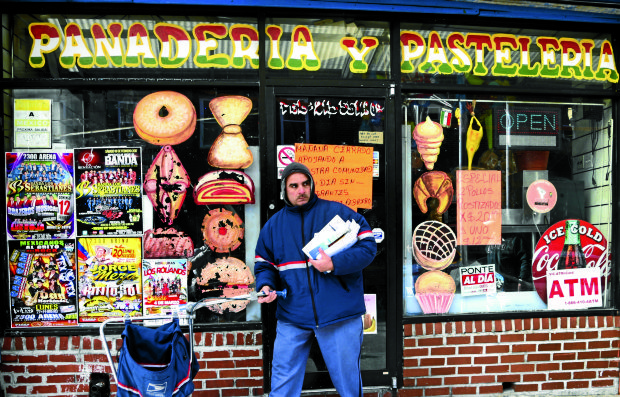
A mail carrier passes a closed bakery Thursday, Feb. 16, 2017, in south Philadelphia’s Italian Market. In an action called “A Day Without Immigrants”, immigrants across the country are expected to stay home from school and work on Thursday to show how critical they are to the U.S. economy and way of life. (AP Photo/Jacqueline Larma)
PHILADELPHIA — The heart of Philadelphia’s Italian Market was uncommonly quiet. Fine restaurants in New York, San Francisco and the nation’s capital closed for the day. Grocery stores, food trucks, coffee shops, diners and taco joints in places like Chicago, Los Angeles and Boston shut down.
Immigrants around the United States stayed home from work and school on Thursday to demonstrate how important they are to America’s economy, and many businesses closed in solidarity, in a nationwide protest called A Day Without Immigrants.
The boycott was aimed squarely at President Donald Trump’s efforts to step up deportations, build a wall at the Mexican border and close the nation’s doors to many travelers.
Organizers said they expected thousands to participate or otherwise show support.
It was unclear how many people participated, but in many cities, the actions were disruptive, if not halting. More actions are being planned for May 1—known as May Day, the internationally recognized holiday honoring workers.
“I fear every day whether I am going to make it back home. I don’t know if my mom will make it home,” said Hessel Duarte, a 17-year-old native of Honduras who lives in Austin, Texas, with his family. He skipped class at his high school to take part in one of several rallies held around the country. Duarte said he arrived in the United States at age 5 to escape gang violence.
The protest even reached the US Capitol, where a Senate coffee shop was among the eateries that were closed as employees did not show up at work.
Organizers appealed to immigrants from all walks of life to take part, but the effects were felt most strongly in the restaurant industry, which has long been a first step up the economic ladder for newcomers to America with its many jobs for cooks, dishwashers and servers.
Restaurant owners with immigrant roots of their own were among those acting in solidarity with workers.
Expensive restaurants and fast-food joints alike closed, some perhaps because they had no choice, others because of what they said was sympathy for their immigrant employees.
Sushi bars, Brazilian steakhouses, Mexican eateries and Thai and Italian restaurants all turned away lunchtime customers.
“The really important dynamic to note is this is not antagonistic, employee-against-employer,” said Janet Murguia, president of the Hispanic rights group National Council of La Raza. “This is employers and workers standing together, not in conflict.”
She added: “Businesses cannot function without immigrant workers today.”
At a White House news conference held as the lunch-hour protests unfolded, Trump boasted of his border security measures and immigration arrests of hundreds of people in the past week, saying, “We are saving lives every single day.”
Since the end of 2007, the number of foreign-born workers employed in the United States has climbed by nearly 3.1 million to 25.9 million.
They accounted for 56 percent of the increase in US employment over that period, according to the Labor Department.
Roughly 12 million people are employed in the restaurant industry, and immigrants make up the majority—up to 70 percent in places like New York and Chicago, according to the Restaurant Opportunities Centers United, which works to improve working conditions.
An estimated 1.3 million in the industry were immigrants in the United States illegally, the group said.
The construction industry, which likewise employs large numbers of immigrants, also felt the effects of Thursday’s protest.
Shea Frederick, who owns a small construction company in Baltimore, showed up at 7 a.m. at a home he is renovating and found that he was all alone, with a load of drywall ready for install.
He soon understood why: His crew, five immigrants, called to say they weren’t coming to work. They were joining the protests.
“I had an entire day of full work,” he said. “I have inspectors lined up to inspect the place, and now they’re thrown off, and you do it the day before the weekend and it pushes things off even more. It sucks, but it’s understandable.”
Frederick said that while he fundamentally agreed with the action and appreciated why his crew felt the need to participate, he felt his business was being made to suffer as a result of the president’s policies.
“It’s hurting the wrong people,” he said. “A gigantic part of this state didn’t vote this person in, and we’re paying for his terrible decisions.”
Among the well-known establishments that closed in solidarity were three of acclaimed chef Silvana Salcido Esparza’s restaurants in Phoenix; Michelin star RASA in San Francisco; and Washington’s Oyamel and Jaleo, run by chef Jose Andres.